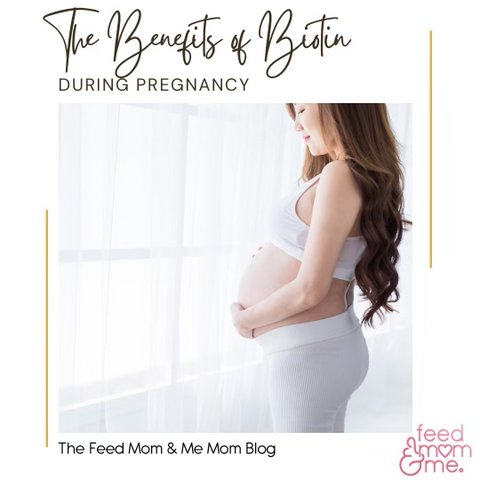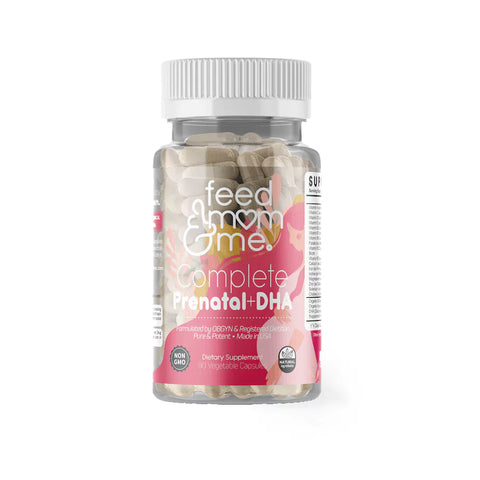Benefits of Biotin During Pregnancy
Published:Updated:

In this article:
★ WHAT IS BIOTIN GOOD FOR?
★ IMPORTANCE OF BIOTIN DURING PREGNANCY
★ POSSIBLE SYMPTOMS OF BIOTIN DEFICIENCY INCLUDE
★ HOW MUCH BIOTIN IS SAFE DURING PREGNANCY PER DAY?
★ HOW MUCH BIOTIN IS TOO MUCH?
★ BEST BIOTIN-RICH FOODS FOR PREGNANT WOMEN
★ BEST BIOTIN SUPPLEMENTS FOR PREGNANCY
Many nutrients are needed during pregnancy to ensure your and your baby's health and safety. Biotin is one of these key nutrients that is essential. While you may have heard of Biotin regarding healthy hair and strong nails, the vitamin actually does so much more for you.
So what is Biotin, what are the biotin benefits while pregnant, can you take biotin while pregnant, and where is it found? Well, good news! You’re about to find out.
★ WHAT IS BIOTIN GOOD FOR?
Biotin, also known as Vitamin B7 or Vitamin H, is an essential vitamin part of the B complex vitamin. It is involved in various metabolic processes, like metabolizing glucose and amino acids, helping regulate blood sugar levels, and giving you energy. It also helps regulate our genes and helps provide structure to our DNA.
Biotin is essential for the breakdown of foods that we eat. Helping convert carbohydrates, fats, and proteins in the food you eat into the energy you need.[1] Without biotin, you would not have the energy you need throughout the day.
Vitamin B7 also helps mom’s hair, skin, nails, eyes, liver, and nervous system stay healthy. Hair health and hair growth are one side effect of biotin, which we love!
★ IMPORTANCE OF BIOTIN DURING PREGNANCY
Biotin is specifically needed during pregnancy as it is a crucial part of fetal growth which is of utmost importance during that time period. Without enough biotin, while pregnant, your baby is at risk of preterm labor and restricted development. Babies are also vulnerable to congenital malformations, also known as teratogenesis.
Biotin is vital for your baby's embryonic growth and aids the rapid dividing of cells for DNA replication. Making it a critical nutrient during pregnancy. Biotin also plays a major role in keeping our immune system running. It helps fight infections and diseases in order to keep our body safe.
Being pregnant automatically causes a degree of biotin deficiency due to the increased demand by both the mother and fetus.
★ POSSIBLE SYMPTOMS OF BIOTIN DEFICIENCY INCLUDE
A deficiency of biotin can lead to hair loss, scaly/skin rashes, high blood cholesterol, and heart problems. It can also have significant negative impacts on the health of your baby. Certain factors can make you more susceptible to being deficient in Biotin, including:
Pregnancy - Pregnancy automatically causes biotin deficiency as there is a higher demand of this vitamin for fetal growth and development.
Breastfeeding - It is important to note that even after giving birth, you may still be at risk of biotin deficiency during lactation.
Smoking - This results in the degradation of biotin.
Excessive Egg White Consumption - Egg whites contain a protein called avidin which binds to biotin and prevents it from being absorbed into the body, which can lead to a biotin deficiency. Be sure to be careful about consuming too many egg whites during pregnancy. Egg whites are found in products such as mayonnaise and Caesar dressing.
★ HOW MUCH BIOTIN IS SAFE DURING PREGNANCY PER DAY?
Like all B vitamins, biotin is a water-soluble vitamin that gets removed from the body daily. Biotin is recommended to take in various amounts depending on an individual's age.
How much biotin per day by age:
- 14-18 yrs Pregnant Women should consume 30mcg
- 14-18 yrs Breastfeeding women should consume 35mcg
- 19+ yrs Pregnant Women should consume 30mcg
- 19+ yrs Breastfeeding women should consume 35mcg
Although very much needed throughout pregnancy, biotin is not always found in prenatal vitamins. Be sure to check the label of your prenatal vitamin for adequate amounts of biotin, as it is a great way to ensure that you and your baby are getting the nutrients you both need. Feed mom & me Complete Prenatal Vitamin contains 100 Mcg of biotin.
Before consuming a biotin supplement, it is always important to get medical advice from your healthcare provider first.
★ HOW MUCH BIOTIN IS TOO MUCH?
There is no upper limit to how much biotin is safe to consume, as research shows that toxicity is super rare. This is because biotin is excreted daily, making it hard to reach a toxic amount in the body. Although biotin toxicity is rare, it is important to stick to the recommended intake amount as too much biotin can alter lab values and may result in a misconception.
Studies have shown that consuming too much biotin can actually help improve diseases such as multiple sclerosis. However, research also indicates that excessive biotin supplementation has been shown to disrupt clinical diagnostic tests, including falsely decreased levels of thyroid-stimulating hormone which can lead to a misdiagnosis of hyperthyroidism. Too much biotin can also alter the results of gonadotropins and vitamin D levels.
★ BEST BIOTIN-RICH FOODS FOR PREGNANT WOMEN?
Consuming foods high in biotin will help keep you and your baby in optimal health during pregnancy.
The following are good sources of biotin foods:
- Egg Yolks = each yolk provides 10 mcg
- Organ Meats (Beef Liver) = provides about 31 mcg
- Fish, such as Salmon, provides 5 mcg (No more than 12 ounces per week)
- Dairy Products, such as Eggs and Milk.
- Nuts & Seeds, such as Pecans, Walnuts, Peanuts, Almonds, and Sunflower Seeds
- Vegetables, such as Sweet Potatoes, Spinach, Broccoli, Avocados, Cauliflower, Mushrooms, Swiss Chard, and Carrots.
- Fruit, such as Raspberries and Bananas
- Legumes, such as Black-Eyed Peas, and Soybeans.

★ BEST BIOTIN SUPPLEMENTS FOR PREGNANCY
One of the best over-the-counter prenatal vitamins during pregnancy is Feed Mom & Me Complete Prenatal with DHA. It contains 100 mcg of Biotin to be sure that both mother and baby are receiving adequate supplementation while your baby is developing!
This prenatal is formulated by an OBGYN & Registered Dietitian, containing all the nutrients needed during and after pregnancy. Each small and easy-to-swallow pill is packed with 22 key natural nutrients to provide nutritional support for you and your breastfeeding newborn. It contains calcium, iron, folate, vitamins A, E, C, D, and B complex, iron, choline, DHA, magnesium, iodine, selenium, and zinc.
The vegetarian formula is free of artificial colors and flavors, chemicals, preservatives, non-GMO, non-dairy, soy-free, and is gluten-free. Each of their capsules contains B6, Organic Ginger, and Peppermint Powder, which can help alleviate morning sickness and nausea.
Adding to that, it is a women-owned company. Who better than a female would understand pregnancy!
- Biotin. (2021, August 19). MedlinePlus. Retrieved from https://medlineplus.gov/druginfo/natural/313.html
- Biotin. (2022, January 10). National Institutes of Health Office of Dietary Supplements. Retrieved from https://ods.od.nih.gov/factsheets/Biotin-HealthProfessional/ Gluckman, P., Hanson, M., Seng, C., & Bardsley, A. (2014, December). Vitamin B7 (biotin) in pregnancy and breastfeeding. In Nutrition and Lifestyle for Pregnancy and Breastfeeding (pp77-80). https://doi.org/10.1093/med/9780198722700.003.0011
- Ichihara, Y., Suga, K., Fukui, M., Yonetani, N., Shono, M., Nakagawa, R., & Kagami, S.(2020, February). Serum biotin level during pregnancy is associated with fetal growth and preterm delivery. The Journal of Medical Investigation, 67(1.2), 170-173. https://doi.org/10.2152/jmi.67.170
- Mock, D. (2009, January). Marginal biotin deficiency is common in normal human pregnancy and is highly teratogenic in mice. The Journal of Nutrition, 139(1), 154-157. https://doi.org/10.3945/jn.108.095273
- Pantothenic Acid and Biotin. (2021, March 11). MedlinePlus. Retrieved from https://medlineplus.gov/ency/article/002410.htm
